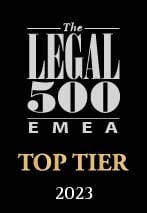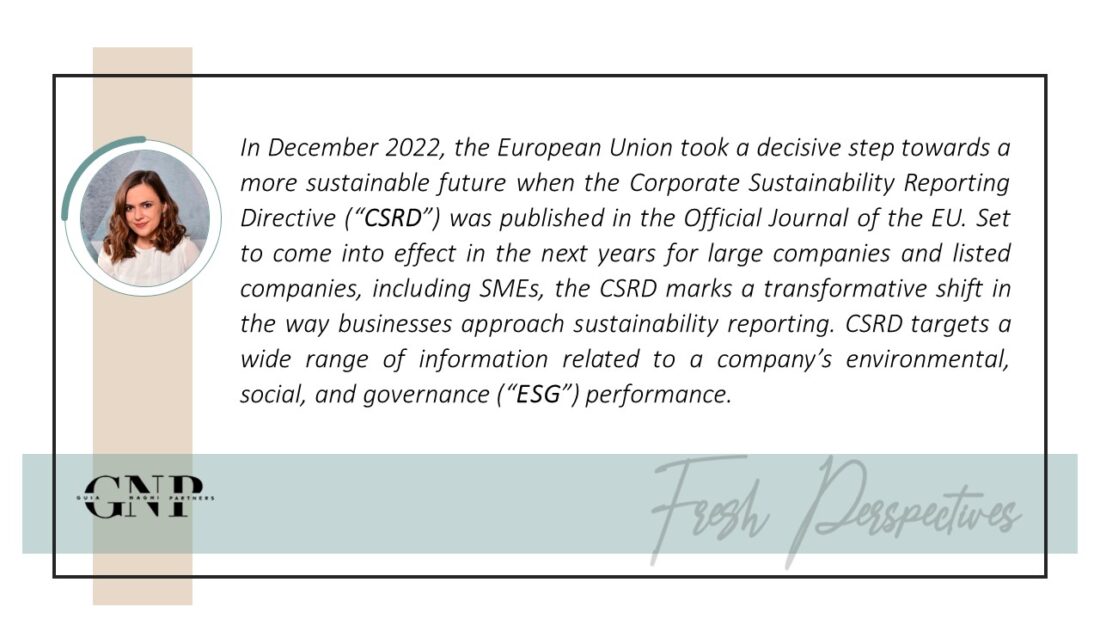Bianca Cernitoiu – Navigating the key aspects of EU’s Corporate Sustainability Reporting Directive (CSRD)
Background
The CSRD represents a significant milestone in the evolution of Environmental, Social, and Governance reporting. It builds upon existing EU reporting requirements, as regulated in the Non-financial Reporting Directive, also known as “NFRD”, by extending its scope and strengthening the emphasis on sustainability metrics. The ultimate goal is to enable investors, consumers, policymakers, and other stakeholders to assess the non-financial performance of an entity.
Targeted companies
In contrast to the NFRD, which exclusively targeted public interest entities with more than 500 employees, the CSRD extends its ambit to include all large companies (with more than 250 employees and more than €40M in turnover and/or more than €20 Million in total assets) and all listed companies, excluding micro-enterprises (with less than 10 employees or below €20M in turnover).
Novelties in reporting obligations
The CSRD introduces new challenges in terms of reporting obligations, mandating targeted companies to publish comprehensive reports on their environmental impact (such as greenhouse gas emissions, energy consumption, water usage, waste production), social and economic performance (including aspects like social responsibility and treatment of employees, and respect for human rights), as well as governance practices (such as board diversity or Anti-corruption measures). These companies will be required to disclose sustainability information in their management reports, thus both financial and sustainability reports are going to be published together.
To this end, the CSRD introduces the European Sustainability Reporting Standards (“ESRS”), which encompass a range of data-intensive disclosures. These standards promise to provide a holistic view of a company’s sustainability performance.
As a novelty, the reporting will be based on a double materiality concept, encompassing both the sustainability risks that affect the company and the company’s impact on society and the environment.
Timeline
Companies currently obligated to report under the NFRD will have the option to include it in their annual report, slated for release in 2025. Meanwhile, all other companies will need to adhere to the new reporting standards starting from either 2026 or 2027. Notably, major corporations will be mandated to incorporate this reporting from the 2025 fiscal year, reflected in their 2026 annual report.
Other initiatives to support EU’s commitment to sustainable practices
The CSRD represents just one facet of the EU’s approach to promoting sustainable practices. The EU has demonstrated unwavering dedication to forging a greener future, exemplified by its comprehensive Green Deal package. Recently, a significant milestone was reached as the Council and the Parliament reached a provisional political agreement on a directive empowering consumers in the transition towards sustainability. The objective of these new regulations is twofold: safeguarding consumers from deceptive practices and empowering them to make more informed purchasing decisions. Notably, broad environmental claims such as “environmentally friendly”, “natural”. “biodegradable”, “climate neutral” or “eco” will be prohibited unless backed by substantiated evidence of recognized exceptional environmental performance relevant to the claim.
These EU initiatives collectively strive for a shared objective: fostering a more sustainable European economy.





No Comments